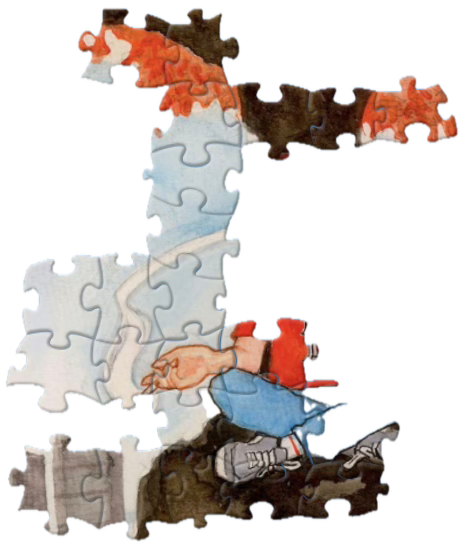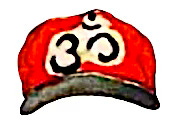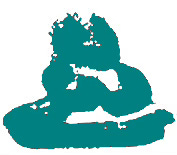Key Links:
Back to Episode #1 • Table of Contents • Family Tree
The Man Who Woke up the Buddha is the story of a guy named Sid who wakes up from a stroke and realizes he's the Buddha, even though he knows almost nothing about Buddhism.
Previously: After wandering aimlessly around the atrium of the cancer center, admiring the art and architecture, Sid was inexorably drawn to the information desk, where a Bodhisattva in the guise of a volunteer, helped guide him in more ways than one. Even the Buddha was impressed with her compassionate nature.
Sid was rarely sad. He figured there was enough sadness in the world without him adding more. He didn’t “feel other peoples’ pain” because, he explained, that would lead to twice as much pain. Yes, the Buddha thought, he knows enough not to be sad, but doesn’t know what to be. Well, hope springs eternal! That was one of Buddha’s favorite thoughts. Not that he played favorites.
There were only three times in Sid’s adult life when he had felt truly sad.
The first was in 1986 when an easy ground ball went through Bill Buckner’s legs, setting the stage for the Red Sox to lose the World Series and further proving the legend that the Sox had been cursed ever since 1919 when they traded Babe Ruth to the Yankees. Sid watched Buckner’s error in a bar in Boston and there was so much sadness all around him, he decided to join in the fun.1
The second time was watching the twin towers collapse on 9/11. There was sadness all across America on that day and Sid felt it was his civic obligation to join in.
Yes, I remember that day, the Buddha thought. And other days when even more people died. Tens or even hundreds of thousands. The Holocaust. Hiroshima. Tsunamis. Earthquakes. No wonder my First Noble Truth was the truth of Suffering. Although, people tended not to get what I meant.
The third time Sid was sad was the day he and Di were visiting Abbey at college in Washington and she insisted they go to the Holocaust Museum. As soon as Sid stepped off the railroad-car-inspired elevator, he felt he was in a museum dedicated to sadness. He kept it together until he came upon the exhibit of weathered leather shoes. Shoes, shoes, shoes, shoes. Shoes of every size and style that had been on the feet of every size and shape of men, women, and children of every age. Tumbling over each other like they’d washed up on a post-apocalyptic shore. He forced himself to look, realizing that it wasn’t six million Jews who died along with some other equally “round number” of gypsies, homosexuals, and so many others. There had been exactly 7,223,480 or 8,463,222 or some other unknowable but specific number of living breathing individuals. Now, they arose before him, witnessing his humanity no more nor less than he was witnessing theirs.2
“Please don’t lean your head against the glass,” the guard had said sympathetically but firmly. He had seen this before.
By the time Di caught up with Sid and took his hand, he was no longer sad. But he was humbled. You had to be fierce to be compassionate.
Sid wasn’t sad about his cancer. He was actually looking forward to the MRI. “Ouch!” he screamed dramatically at the top of his lungs when the drill-sergeant of a technician pricked his wrist to insert the IV for the dye.
“Gee will this get me into that Blue Man Group?” he asked. It was one of many off-color jokes the tech had heard so many times she didn’t react.
Sid was determined to make her laugh.
“Guess you can’t transport me to Saturn since you made me take off all my rings.” Nothing.
“Does MRI stand for Most Ridiculous Invention of all time?” Nothing.
“Wait ’til you see my Hippocampus! It’s right out of Animal Planet.” Nothing.
“Can you take pictures of my past lives?” Nothing.
The technician just continued setting things up.
If they could just read his aura, he wouldn’t have to go through all this, the Buddha thought. Well, as long as he’s having fun.
“I surrender,” Sid said.
The technician turned, looked at him, and smiled. “Gotcha!”
You sure did, the Buddha smiled.
She handed Sid some headphones, helped him onto the table, placed a coil on his head, and looked at him with an even brighter smile, clearly daring him to make a joke she hadn’t heard.
“I get a halo?”
She just shook her head. Nowhere near good enough.
The Buddha just shook his head, too.
“Lie perfectly still and squeeze this ball if you need something…Don’t even try,” she added.
And with that, the table slid into the tunnel and all hell broke loose. Literally.
The noise redefined cacophonous. It was as if the entire history of the industrial revolution was reeling on fast forward through his brain.
Then, each blast started bringing forth a famous warrior:
Caesar crossing the Rubicon.
Boudicca leading Celts in a futile revolt against the Roman invaders.3
Agamemnon at the gates of Troy.
Ashoka laying waste to the rebellious territory of Kalinga.4
Sid should have known Hitler was coming.
It wasn’t the hyper manic mad dictator of the newsreels. It was a stern professor with a bad comb-over wearing a tight double-breasted jacket. In front of a class of students he assumed would never get it.
Sid looked for a seat in the back. But the Buddha led him to the front row.
“I know what you’re asking,” Hitler began diffidently. ‘‘Why did you do that?’ 'What were you thinking?’ ‘How could you possibly?’”
“You think your childish prayers could end war? No! Only war could end war! ‘Bring it on,’ I said. Let the final battles be fought within my soul. I will lead ALL the armies. The conquerors and the conquered. The fearsome and the fearless. The rebellious and the tyrannical. They were all drawn to my vision.”
The Buddha didn’t say anything. He just started turning summersaults and doing jumping jacks.
Hitler looked at him with disdain and brushed him aside.
“You think Jesus made the ultimate sacrifice for you? What about Adolph Hitler who opened his soul to embrace all that is reviled? Jesus was only crucified once before being raised to his rather comfortable position at the right hand of the Lord. I am crucified day after day in your self-righteous minds and hearts.”
The Buddha didn’t say anything. He just clapped and pumped a fist in the air.
Hitler looked at him with disdain and brushed him aside.
“Let the historians wrestle with explanations, justifications, and condemnations—I only wrestled with the spirits who waged war within me.”
The Buddha didn’t say anything. He just put his thumbs in his ears and made monkey faces.
Hitler looked at him with disdain and brushed him aside.
“A vast orchestra of uncommon karmic complexity came together and I…I was chosen to be the conductor—to bring all the players and their hidden bogeys out of the closet.” He paused. Thoughtful. Pleased with himself. “Where better to bury your sins than in the darkest of lights?!”
The Buddha put his thumb on his nose and wiggled his fingers.
Hitler looked at him with disdain and brushed him aside.
“After me, there would be no need for racial conflict. After me, there would be no need for genocide. After me, there would be no need for war. I took it as far as it could possibly be taken!”
A little further than that, the Buddha thought, looking at Hitler wistfully, as if he were a leaf with curled dry, edges blackened by mold. Hitler had indeed tried. But failed. Swept away on waves of his own madness. Now he would vaporize into particles smaller than atoms until only one remained. The one that was there at the beginning. And that would be there at the end. Maybe sometime there would be a chance to try again.
“All spirits could finally have come together as ONE. That’s why I insisted on total victory. A final solution.”
The Buddha didn’t feel compassion. He didn’t feel hate. He was neither repelled nor attracted. He looked at Hitler as if he were nobody special…just as Hitler had looked at his victims.
The dictator had grown used to condemnation. But this was different. “This fool mocks my sacrifices,” he grumbled angrily. “Plus the noise of this infernal machine! Each beep, grind, and whir a knife-like scream in the wilderness.”
“‘Never again’ you all said? And yet, instead,” Hitler shook his head turning away and sighed, “it’s forever again and again and again. Sometimes,” he said, with a sudden breath of humanity, “I felt like a runner who has collapsed at the finish line, only to look up and see that everyone else thinks there are more laps to run.”
Hitler finally began to unravel.
Sid twitched as he awoke to the scene. He wondered if they were in over their heads.
What difference would that make? The Buddha thought, amused that Sid still clung to duality. He, on the other hand, was thrilled in a way that he had rarely been since he got up from that tree, looked around, and said, “Oh, my…” Thinking… not just thinking but experiencing…that he was effervescently One with all creation.
Besides, he knew what the real conductor was.
There wasn’t just the Now. Nor even the Not Now. All that is was just the tip of the iceberg of all that is. The Bodhisattvas coming back in his name to save all sentient beings did not realize what wonders still awaited them. But he was sure they would gladly discover them. It would be fun. Not a burden. Not a struggle. Not a discipline.
The Buddha experienced a wave of vertigo followed by another of awe. He staggered to his etheric feet—more human than he’d felt in 2500 years—and tiptoed quietly away, making sure no particles of Hitler remained behind. The Buddha smiled. Another good day’s work, he chuckled to himself.
Then, the Buddha lay down on his right side, his right hand under his head.
Sid was surprised when the machine turned off. He thought he’d only been there 10 or 15 minutes, not the hour they said he was in for.
As the table began to move out, Sid rolled on his right side, right hand under his head.
“You did great Mr. Sid,” the tech smiled at him. “We’ll get these evaluated right away to see what’s going on up there.”
What is going on up there, Sid thought to himself.
Excellent question, the Buddha thought.
“Huh…” Sid said out loud.
Next Episode: Sid tells Marcus about his trip to the cancer center as they walk to the store early one morning to get coffee, apple cider donuts, and the morning paper. There, Sid, with more than a little help from the Buddha, gives his own revisionist perspective on the formerly famous Four Noble Truths.
This example redemption and harmony pleased Sid. Besides, he was a Red Sox fan.
There are various sources for finding, as best as possible, the number of individual Jews: 5,596,000-5,860,000 (https://tinyurl.com/z6f6su67); Gypsies: 250,000 to 500,000 (https://tinyurl.com/3mzbcnbk); and (sadly) countless others: people with disabilities, gay, bisexual, Jehovah’s Witnesses, Ethnic Poles, “professional criminals,” and more (see: https://tinyurl.com/2wf2rkzd).
Boudicca was a kick-ass Celtic queen who led a heroine-ic rebellion against the occupying Roman army in the first century AD.
Ashoka was a 3rd century BC ruler of what we now call India, who converted to Buddhism after seeing the destruction caused by a war in which he conquered the region to the south, known then as Kalinga. He’ll be back.








oh just figured out. You were trying through the Substack app. I'll try to figure out why that doesn't work. Thanks for pointing it out.
The button to listen to the episode doesn’t work? I couldn’t listen at any rate. Superb episode, waiting (patiently) for more!